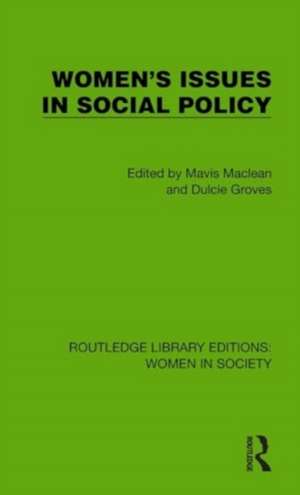Women's Issues in Social Policy: Routledge Library Editions: Women in Society
Editat de Mavis Maclean, Dulcie Grovesen Limba Engleză Hardback – 20 noi 2024
Women’s Issues in Social Policy incorporates recent research findings written from a feminist perspective and reveals the breadth and depth of recent work in previously unexplored areas such as time budgeting and transport, as well as developing analysis in traditional areas of interest such as health and personal care.
The editors also looked into the wider European context and included a chapter which examines whether the abortion issue would give birth to feminism in Poland.
Women’s Issues in Social Policy will be of value to teachers and students of social policy and women’s studies, as well as of interest to the general reader.
Din seria Routledge Library Editions: Women in Society
- 18%
 Preț: 634.78 lei
Preț: 634.78 lei - 18%
 Preț: 634.86 lei
Preț: 634.86 lei - 18%
 Preț: 635.10 lei
Preț: 635.10 lei - 5%
 Preț: 858.62 lei
Preț: 858.62 lei - 18%
 Preț: 598.45 lei
Preț: 598.45 lei - 18%
 Preț: 634.78 lei
Preț: 634.78 lei - 18%
 Preț: 635.38 lei
Preț: 635.38 lei - 18%
 Preț: 917.62 lei
Preț: 917.62 lei - 18%
 Preț: 636.07 lei
Preț: 636.07 lei - 18%
 Preț: 635.53 lei
Preț: 635.53 lei - 18%
 Preț: 634.78 lei
Preț: 634.78 lei - 18%
 Preț: 812.81 lei
Preț: 812.81 lei - 18%
 Preț: 741.73 lei
Preț: 741.73 lei - 18%
 Preț: 599.14 lei
Preț: 599.14 lei - 18%
 Preț: 1092.89 lei
Preț: 1092.89 lei - 18%
 Preț: 634.86 lei
Preț: 634.86 lei - 18%
 Preț: 635.81 lei
Preț: 635.81 lei - 18%
 Preț: 599.48 lei
Preț: 599.48 lei - 18%
 Preț: 598.96 lei
Preț: 598.96 lei - 5%
 Preț: 14064.46 lei
Preț: 14064.46 lei
Preț: 635.46 lei
Preț vechi: 774.95 lei
-18% Nou
Puncte Express: 953
Preț estimativ în valută:
121.59€ • 127.63$ • 100.93£
121.59€ • 127.63$ • 100.93£
Carte tipărită la comandă
Livrare economică 11-25 aprilie
Preluare comenzi: 021 569.72.76
Specificații
ISBN-13: 9781032862996
ISBN-10: 1032862998
Pagini: 252
Dimensiuni: 138 x 216 mm
Greutate: 0.63 kg
Ediția:1
Editura: Taylor & Francis
Colecția Routledge
Seria Routledge Library Editions: Women in Society
Locul publicării:Oxford, United Kingdom
ISBN-10: 1032862998
Pagini: 252
Dimensiuni: 138 x 216 mm
Greutate: 0.63 kg
Ediția:1
Editura: Taylor & Francis
Colecția Routledge
Seria Routledge Library Editions: Women in Society
Locul publicării:Oxford, United Kingdom
Public țintă
Adult education, General, and PostgraduateCuprins
Introduction. Part I: Filling the Gaps 1. Time to Care Hilary Land 2. Poverty: The Forgotten Englishwoman – Reconstructing Research and Policy on Poverty Caroline Glendinning and Jane Millar 3. Women and Financial Provision for Old Age Dulcie Groves 4. Women and Transport Kristine Beuret Part II: Our Traditional Concerns 5. Well Women Clinics – A Serious Challenge to Mainstream Health Care? Peggy Foster 6. Putting on an Act for Children? Miriam David 7. Women and Community Care – Reflections on a Debate Sally Baldwin and Julia Twigg 8. ‘What D'ya Want If You Don’ Want Money?’ – A Feminist Critique of ‘Paid Volunteering’ John Baldock and Clare Ungerson Part III: Research and Progress 9. The Long Term Effects for Girls of Parental Divorce Mavis Maclean and Diana Kuh 10. Sex and Motherhood as Handicaps in the Labour Market Heather Joshi 11. Feminist Research and Social Policy Janet Finch 12. Will the Abortion Issue Give Birth to Feminism in Poland? Malgorzata Fuszara. Name Index. Subject Index.
Notă biografică
At the time of original publication the editors had been members of the Social Administration Association (now the Social Policy Association) since its inception in 1967, and in 1987 convened a conference in Women and Social Policy in Oxford where this volume originated.
Mavis Maclean was a fellow of Wolfson College, University of Oxford.
Dulcie Groves was an Honorary Lecturer in Social Policy at the University of Lancaster.
Mavis Maclean was a fellow of Wolfson College, University of Oxford.
Dulcie Groves was an Honorary Lecturer in Social Policy at the University of Lancaster.
Descriere
During the 1980s a notable development in mainstream social policy in the United Kingdom was the emergence of a feminist critique. Originally published in 1991, Women’s Issues in Social Policy was intended as a contribution to the social policy literature which could also be used in a women’s studies context.
